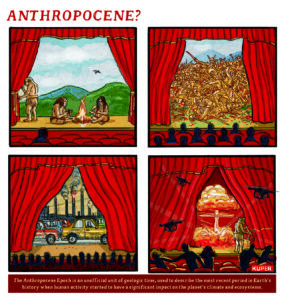Public Pressure Is the Best Hope for Climate Action
On Sunday, a crowd calculated by organizers at more than 300,000 took part in the biggest march ever against climate change. Shutterstock
Shutterstock
We are taking a huge gamble with the world’s future. Individual nations — and citizens — must choose to do the right thing to reduce carbon emissions and limit climate change, even if it means paying an economic cost. Counting on altruism is risky.
But it just might work.
More than 100 world leaders will assemble Tuesday at the United Nations to discuss what they are already doing, and further steps they might take, to address what majorities in many developed nations see as the gravest and most urgent problem facing the planet. No concrete action will be taken. President Obama will be there, but the leaders of the countries ranking first, third and fourth in emissions of heat-trapping carbon dioxide — China, India and Russia — say they have scheduling conflicts that make it impossible to attend. The calendar of actor Leonardo DiCaprio was free, however, and he will give one of the opening speeches.
Does this make the U.N. Climate Summit a waste of time? Not if you believe, as I do, that public awareness and pressure are the best hope for effective climate action.
In 1992, at the first international gathering of leaders to discuss climate change — the Earth Summit in Rio de Janeiro — it seemed inevitable that the final outcome, after another round or two of tough negotiations, would be a binding treaty in which nations agreed to strict limits on carbon emissions. The concentration of greenhouse gases in the atmosphere would level off, global warming would be held to a manageable level and the world would be saved.
That was then. Now things look quite different.
In the intervening decades, China has shot past the United States to become the biggest emitter of carbon dioxide, by far, and India has zoomed up the list. Russia’s economy is now based on the extraction of fossil fuels. The concentration of carbon dioxide in the atmosphere has continued to increase steadily and today is 42 percent greater than before the Industrial Revolution, according to the World Meteorological Organization.
Post-Rio agreements have done more good than harm in limiting emissions in Europe and the United States. But China, India and other rapidly industrializing countries refuse to have their development prospects constrained by firm restrictions on the amounts of coal, oil and gas they burn.
Negotiators will take another shot at working out a treaty next year in Paris. But even if a landmark agreement were miraculously to emerge, it would have almost no chance of being ratified by an ideologically divided U.S. Senate. And if the world’s richest nation and second-biggest carbon emitter refuses to agree to mandatory limits, there is no chance that China and India would sign on.
Hopeless? Not if you paid attention to what happened in New York the past few days.
On Sunday, a crowd calculated by organizers at more than 300,000 took part in the biggest march ever against climate change, timed to highlight the upcoming summit. Perhaps an equal number participated in smaller satellite marches around the world. The mass mobilization showed that even in the United States, there is effective grass-roots organizing and considerable passion about climate change.
I say “even” here because a recent Ipsos global survey showed that only 54 percent of Americans agree that “the climate change we are currently seeing is largely the result of human activity” — dead last among countries covered by the poll. By contrast, 72 percent of respondents in Germany and 80 percent in France agreed with the statement.
But 80 percent of those surveyed in India and 93 percent in China also agreed that humans are causing climate change. Large majorities in those countries also agreed that “we are heading for environmental disaster unless we change our habits quickly.”
If governments cannot agree on an international regime of carbon limits, alarmed and determined individuals must take the initiative. Which brings me to what happened Monday: The Rockefeller Brothers Fund — the family foundation of the nation’s greatest oil dynasty — announced plans to divest itself of fossil fuel investments, citing concern about climate change.
According to Divest-Invest, a kind of nonprofit clearinghouse for such pledges, individuals and institutions controlling more than $50 billion in assets have announced they are pulling their money out of fossil fuels and redirecting them toward renewable energy technologies.
That’s a start. It seems that if governments are ever to tackle climate change, we the people will have to show them the way.
Eugene Robinson’s e-mail address is eugenerobinson(at)washpost.com.
© 2014, Washington Post Writers Group
Your support matters…Independent journalism is under threat and overshadowed by heavily funded mainstream media.
You can help level the playing field. Become a member.
Your tax-deductible contribution keeps us digging beneath the headlines to give you thought-provoking, investigative reporting and analysis that unearths what's really happening- without compromise.
Give today to support our courageous, independent journalists.






You need to be a supporter to comment.
There are currently no responses to this article.
Be the first to respond.